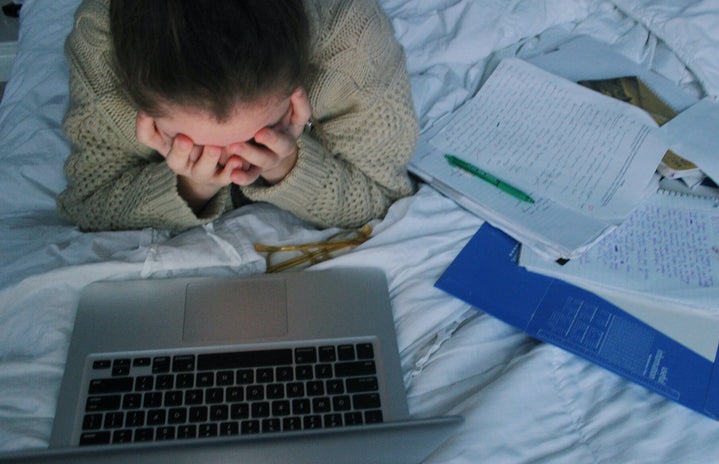Dear Her Campus Notre Dame Readers,
Procrastination. We all either take part in it, know of it or know someone who suffers from it. It is the action of postponing or delaying something, either right before a deadline or indefinitely. It is the source of crippling stress, suffering, self-loathing and wondering, “what the hell is wrong with me?” for endless amounts of people. As a matter of fact, I just took a 45-minute break between writing those first three sentences and this one. I watched a bunch of cooking videos on Snapchat that I’ll never actually cook, saw some stand-up comedians on Instagram explore, talked to my roommate and got a PopTart from the vending machine. I am a certified master procrastinator. I am also good friends with certified master “doers,” the polar opposite of procrastinators. These doers cannot fathom the idea of not starting an assignment as soon as it’s posted, and they are terrifyingly productive. Doers are the kind of people that piss procrastinators off; not because we don’t like them as people, but because we envy them and their good habits. For instance, last week when I was rushing to finish my physics homework before the midnight deadline, one of my best friends who is a “level 10/10 doer” was watching Netflix next to me having finished not only this assignment early but ALSO next week’s homework. I know right? Psychotic.
Doers are often unable to put themselves in the shoes of a procrastinator. “Why can’t you just sit down and get it done really quickly?” my friend asks me. “Why would I do this really hard problem set that is due tomorrow when instead I could ironically watch this ‘How to Stop Procrastination’ video on Youtube?” I reply. Conversely, I think I can speak for a majority of procrastinators when I say that it’s difficult to put ourselves in the shoes of a doer, as well. It baffles me how they can find the motivation and energy to start on an assignment whose deadline is not an impending threat. Consequently, I decided I would try my best to explain my side of the argument to those interested in finding out what is going on inside the head of a procrastinator, and hopefully throughout this journey maybe discover some bad habits I could target to improve my time management. I will also touch on some steps I try to take to improve my procrastination in college.

So why do I procrastinate? Obviously, these answers are from amateur introspective analysis I’ve done on myself throughout the years to try to justify my procrastination, and the true causes are probably deeper-rooted issues that will remain a mystery to science and humanity for a long time to come. For the sake of the argument, I will be referring to procrastination in an academic way, even though procrastination can also be applied to life and long-term goals; but that’s a much more complicated, darker and not-so-funny topic for another time. With that being said, one of the main reasons I find it difficult to start an activity is because I tell myself that it needs to be the perfect time and setting for me to sit down and begin working. If I only have an hour of time—say, between classes—I tell myself that that’s not enough time to actually get a good start on things, especially because I’m not particularly productive even when I am working. Therefore, I just don’t start it. If it’s too loud, I can’t focus. If it’s too quiet, I also can’t focus because I can literally hear myself think. From personal experience, I would claim procrastinators are often easily distracted like this. That is, until the deadline is imminent and looming in which case I temporarily become the supernatural human embodiment of productivity.
Another major reason behind my procrastination is my prioritization of instant gratification over long-term, rational decision making. If the immediate threat of a deadline or exam date is not yet evident, I live very much in the moment. I repeatedly choose activities that immediately reward me with entertainment over those activities that I need to further myself as a student and career-wise because I fail to see the big picture at that moment. The sad part is, I don’t even fully enjoy these procrastinating activities because I can feel the weight of the future consequences of my actions, and I know that I shouldn’t be doing what I’m doing at the moment. Yet somehow, I can’t seem to change this self-destructive behavior.
This brings up an important point: self-awareness of procrastinators. Have no doubt, we usually know what we are doing and how detrimental to our future mental health our present actions are. Despite that knowledge, we still procrastinate. My totally-not-legit theory for this phenomenon is that we are far too deep in a vicious cycle of procrastination and last-minute success that further propagates our future procrastination. In other words, because I always end up getting things done and at a fairly high quality, I don’t feel the need to change my behavior. Procrastination has always worked for me in terms of turning in assignments on time and getting the grade. However, the reason why I’ve recently been making a conscious effort to improve my time management skills is because of the enormous stress that arises right before deadlines, and because I see how relaxed and nonchalant my “doer” friends always are. Additionally, college has forced me to work on my procrastination because while in high school I could stay up all night finishing homework and then sleep through class, I knew that that wouldn’t really cut it in my Notre Dame courses.

Some steps I try to take to get my work done early are surrounding myself with productive people, making a to-do list that is very satisfying to cross off, starting homework right after my classes finish for the day and putting my phone completely away from sight while I am trying to focus. Surrounding myself with people who have their lives together while doing homework motivates me and keeps me accountable to actually get work done. Having a to-do list that is always visible to me (I use a sticky note on my laptop) helps me visualize what I need to get done without forgetting anything and really motivates me to cross off items. Starting homework right after my classes get out helps me work with the momentum from the academic day; while if I take a “break,” only God knows when—if ever—I’ll get back to work. Lastly, because nowadays phones are arguably a student’s biggest distraction, I shove my phone far enough down my backpack that I won’t even hear a buzz if I get a notification. These tips have honestly helped me immensely; and although I still have a long way to go, I can proudly say I have significantly improved in my bad procrastination habits.
Now that I have laid all my cards on the table, I invite a “doer” who has their life together to tell their side of their story, share where they find the momentum for productivity and spill their secrets. Please, I am begging you.
Sincerely,
A Procrastinator
Follow HCND on Twitter, like us on Facebook, Pin with us and show our Instagram some love!


